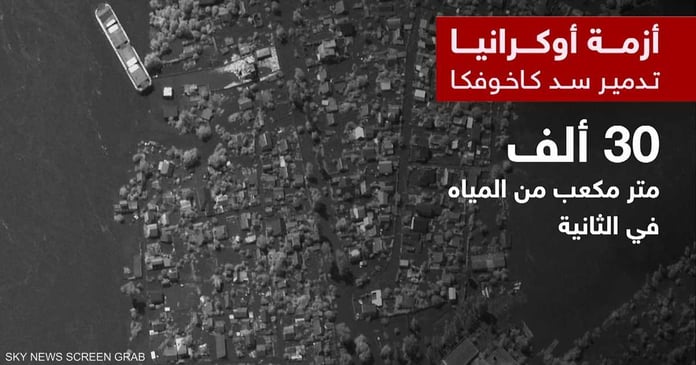In a quick reaction, global wheat and corn prices rose hours after news broke of the Ukrainian dam collapse, as wheat prices rose 2.4% in early trading on the Chicago Mercantile Exchange, at $6.39 a bushel, and corn prices rose more than 1% to $6.04 a bushel.
What happened?
The Kakhovka dam on the Dnipro was destroyed by an explosion on Tuesday, flooding large areas, including populated areas. Ukraine accuses Russia of bombing the dam. Moscow denies any responsibility for the explosion of the dam, but carries out a campaign of airstrikes on the Ukrainian energy system. Kiev says other dam infrastructure was damaged.
International Warnings
The World Food Program has warned of the “devastating repercussions” for people suffering from hunger around the world following the destruction of the Kakhovka dam in Ukraine. According to preliminary estimates, the Ukrainian Ministry of Agriculture expects about 10,000 hectares of agricultural land to be flooded on the northern bank of the Dnipro in the Kherson region. The ministry said that several times this area should be submerged in the area on the southern bank of the river, which is occupied by Russian forces. The United Nations Emergency Relief Coordinator, Martin Griffiths, said what happened at the Kakhovka dam could be the biggest incident of destruction of civilian infrastructure since the start of the war in Ukraine, stressing that the destruction of the dam is “a blow to agricultural activity and increases the risk of mines.” Residents of flooded areas in Mykolaiv, Kherson and Zaporizhia regions have been prevented from fishing, selling and eating fish, amid warnings about the risk of food poisoning.
Crop destruction
According to the American Associated Press, there are huge agricultural fields in southern Ukraine where the dam burst, endangering crops in the path of floodwaters.
“Anytime there are signs of this war escalating, there will be a lot of anxiety and markets will react quickly,” says Joseph Glauber, senior research fellow at the International Food Policy Research Institute.
In the same context, Andrei Sizov, director general of the Black Sea Agricultural Markets Research Society, believes that “the collapse of the dam seemed like a major escalation with serious consequences and great risks”.
Expectations of lower food exports from Ukraine are likely to continue in the coming period, as Kiev is now able to export 40% of grain compared to two years ago.
And the British newspaper “The Guardian” estimated that the damage caused by the collapse of the Kakhovka dam could take decades to heal, explaining that “the loss of the reservoir will mean that there will be much less drinking water for people. towns in the region and the irrigation of the surrounding agricultural belt, which will have an indirect impact on food production” and on exports of wheat, maize, sunflower oil and soybeans to the rest of the world.
suffering of developing countries
For his part, economic expert Muhammad Shadi said in statements to “Sky News Arabia” that Ukraine is a very important country in the production and export of grain, as it is the fourth largest exporting country in the world, and therefore any effect that occurs within it casts a direct shadow on food worldwide, especially on wheat and corn.
Regarding the impact of the Kakhovka dam collapse on the global food crisis, Shadi explained that:
The area where the dam collapsed produces about 6% of Ukraine’s wheat production, or about 20.8 million tonnes, and depriving the world of it will have a severe impact. In addition, Russia is trying to reduce the amount of grain that Ukraine exports through the Black Sea agreement or by targeting agricultural land, and what happened yesterday indicates a decrease in the supply of wheat and maize from poor countries. This will affect the amount of food available in the world, and we could see a new surge in food prices, as the world has suffered since the outbreak of war. Developing countries will be greatly affected if the current situation continues and there is no intervention to stop this escalation, and the budgets of these countries will be affected and the balance of payments will incur larger figures, while costing them additional debt. In the future, and with the continuation of the conflict, we will see either a growing increase in hunger rates around the world or an increase in debt, especially with the tightening of monetary policy around the world.
Read the Latest World News Today on The Eastern Herald.


